#laundry service era
Text









like or reblog if you save or use ♡
9 notes
·
View notes
Text





ELECTRIC TOUCH — [jason grace dating headcanons]
author's note: i need 2024 to be THE year. 2023 did me soooo dirty. im praying


dating JASON GRACE would be like dating someone from a regency era romance novel…he’s just SUCH a hopeless romantic but he would rather die than admit it.
in the initial first few weeks of dating, jason was sosososooooo shy about pda/physical touch. it’s not that he was uncomfortable, he LOVES physical touch, but he had just gone so long without it that he wasn’t used to it. but eventually, he warms up to it…and now he can’t go without having at least one part of him touching you 😭
when it came to things like hugs, kisses, handholding, etc. jason would always wait for you to initiate it because he was so anxious about making you uncomfortable ?? fjsldfjs
but when you communicated that he didn’t need to ask/wait for you all the time, jason started initiating things more. even still, he occasionally gets nervous to even hold your hand? like wdym you’ve been dating for over six months and you still get nervous doing simple couple things 😭 it’s very endearing though
chivalry is NOT dead,, and it’s because of jason LMAO. he’s the type to swap shoes with you even though you’re wearing heels that are 3x too small for him, but hey, at least your feet don’t hurt anymore!
jason’s also hellbent on carrying things for you, opening doors for you, pulling out/pushing in chairs for you, etc… GOD HE’S SO CUTE.
since dating him, you don’t think you’ve ever touched a single door or car handle when he’s with you.
jason is NOT afraid to advocate or stand up for you, especially if you’re more on the quiet & non-confrontational side. if you’re in a group setting and someone interrupts you, he’s making sure you get your chance to say what you wanted to say. and he doesn’t do it in a way that leaves you embarrassed, he’s very very classy with it!
if you’re a big music person, jason will literally learn your favorite artist’s entire discography so you guys have another thing to talk about.
you guys also have a shared playlist of “your songs” and he’s so serious about it 😭 if jason hears a song that even remotely reminds him of you, he’s going to the ends of the earth to figure out what it’s called.
rip to anyone around him if shazam doesn’t work! he’s gonna send voice messages to your big group chat humming the tune, but he’s so tone deaf that no one knows the song…and his search history is just variations of “song that goes du du ooh du ooh du du ooh” a for effort though babes…
jason’s love languages are definitely acts of service and quality time. over the years and throughout the many battles he’s fought, he’s come to realize that all he wants to do when he comes home is just spend time with his loved ones.
after a busy day, you’ll come home to find your laundry folded, bed sheets washed & freshly made, along with a sweet little note from jason <3
your guys’ thing are writing notes to each other. considering his and your busy schedule, you’ll write and leave tiny notes around the house for each other to find. it’s one of the many reasons why jason gets up in the morning.
he loves coming home to you after a long day to simply melt in your arms. there’s just something so soothing about cuddling with you after a busy day.
it does not matter where you are, you guys could literally be cleaning the camp toilets and he’d still be able to find the fun in it. you’re his home, and he’d follow you wherever you go.
if you play sports, you already know he’s showing up to ALL your games. it doesn’t matter if it’s pouring rain or if it’s hours away, he’s absolutely determined to show his support. jason even makes posters with your jersey number and when you have big tournaments he’ll show up with posters of your face 😭 the refs are SO tired of jason help
i feel like if he really tried, jason would be a good cook.
one day you sent him a recipe you saw online saying you wanted to make it with him, but then he decided to make it himself to surprise you. and it was actually so good???
JASON IN A “KISS THE COOK” APRON OMFG. that’s what you got him for his birthday and every single time without fail, he’ll wear it when he’s cooking.
one of his hidden talents is that he’s super good at origami. he originally picked it up because he heard it was a good stress reliever, but now he also does it for you <3
he loves your reaction when he gives you little paper rings or an origami version of your favorite animal!
this guy DREAMS of domesticity. he’s always been the type to date to marry, and that’s just what he intends to do with you! even though you guys are still young, he’s been planning your proposal sfjfls
tell me why he already knows what kind of ring he wants to get you… omg.
he really wants to just settle down with you in new rome. but honestly, he’s willing to do anything as long as you’re at his side.
expect flowers from jason at least once a month! he even keeps one flower so he knows when it’s time to get you a new bouquet. and if he’s away, he’ll get one of his friends to deliver it!
i have this headcanon that the aphrodite cabin teams up with the hephaestus cabin to throw a really elaborate party, essentially like prom. anyways, jason would go all out for your promposal jfdsls i feel like he would either do a super funny poster/proposal like y’know that one guy who did that medieval promposal 😭 yeah well jason would do something like that but like...more roman... LMFAO him pulling up to your place in a chariot
or he would do something super super intricate and planned out…like a fancy picnic and then he’d have the fauns arrange fireflies to spell out “prom?” when it’s dark out.
ugh! jason grace the man that you are… <3 best bf ever,, i can confirm btw


#jason grace#jason grace x reader#jason grace x y/n#jason grace x you#jason grace fanfiction#jason grace fanfic#jason grace fluff#jason grace fic#percy jackson#percy jackson x reader#heroes of olympus#heroes of olympus x reader#rick riordan#riordanverse#percy jackson fandom#percy jackson headcanon#percy jackson fic#percy jackson fanfiction
996 notes
·
View notes
Note
As someone who's college age: yeah, there's a TON of people my age who don't know how things work and don't try to learn. Can't unzip a zip file, want to know where to download anime but haven't tried looking it up, ask things on subreddits a Google search or quick search on the wiki would answer, ask questions answered in FAQs or by professors or in the syllabus, say they can't download and install a new browser or app or program because they don't know how and they never think to look up how to do so, go months without logging into their student email because no one explained to them how to do so and they never thought to ask anyone how to do it, go months without washing their laundry because they don't know how and they also don't know how to look up instructions on how to do it, don't know how to cook and can't Google a recipe so they throw things in a pan and pray it works out, don't understand how to back up files, don't know how to attach a pdf to an email to send to a professor, cannot manage to put stuff on a USB drive + go to the library + print it off of the library computer, etc.
I spent most of freshman year teaching people things. The year after, my patience got more frayed and "Google it" started coming out of my mouth a lot more. This last year I gave up and now if people fuck themselves over, that's their decision. I'm not going to stand there begging people to do basic things they should already know how to do.
It was really funny when someone from Career Services came to talk to us about resumes and said we didn't need to put down 'can use Microsoft Excel' on there because everyone knew that and all but three people said actually no, they didn't. People who are 40+ really think we're all good at tech by default, like we fall out of the womb clutching a little phone already making spreadsheets in Excel or coding computers or whatever.
Meanwhile in reality you see a ton of people posting on tumblr going, "How do I post fic on tumblr?" whose blogs proudly state that they're under 18. The thought that you could just type into a Word doc and then copy and paste onto here never hits. And it's not going to.
I hate to break it to millennials and older people but yeah, actually, my generation does in fact have morons. We're not a moron-free demographic. I'm pretty sure moron-free demographics don't exist, tbh.
--
It infuriates me that my father (in his 80s) is always saying to me that he needs to find a 12-year-old to explain his tech to him. I (40s) keep telling him it's more like a bell curve or something. We had a blip of people being taught in school or having their asses kicked about technology. But then it went away again.
I think we made computers and then phones much more accessible, which is great, but we forgot we still need to teach people things. I know not everyone got explicit instruction in school even in my era, but it seems like the US, at least, phased some of that out as we started assuming The Youth automatically knew it all.
That said... in my day, college freshmen were also terrible about doing their laundry, so some things never change.
262 notes
·
View notes
Text
svt as boyfriends ♡ wonwoo edition

member: wonwoo x gn!reader
genre: fluff, bullet points :3
word count: 876
summary: wonu's gamer bf era
warnings: none !! just know that i am in love with jeon wonwoo. (me saying things like that is what makes it hard to see i'm a junhui ult on this blog)
author's note: happy wonwoo day !!!!! summer is about half way over :( but I hope this wonu boyfriend au will make you feel better <3

There is absolutely no way that the Jeon Wonwoo is not the “gamer bf”
I have some very specific thoughts about boyfie Wonwoo so buckle your seatbelts and make sure to keep all hands and feet in the cart while it is in motion
Quality Time
Jeon Wonwoo is the king of quality time!!
He would so much rather just chill with you at home than go anywhere
Hates parties and only goes to them if another member of svt is hosting it because he’ll feel bad if he doesn’t spend time with his brothers
Feels uncomfortable around your friends but will go with you to see them anyway because as long as he’s with you, he’s happy
ABSOLUTELY loves when you ask if you can join him when he is gaming!
If you play games a lot, he’ll be all pouty when you beat him at something like Call of Duty, but if you don’t play games a lot, you’ll be pouty when you find out he let you win at Mario Kart
He would also love to just have cuddle time where he reads his articles online and you just game on your phone, read a novel or something
Words of Affirmation
THIS MAN IS FSDKJFNSDKJ so good at affirmation pls I could sob just thinking about it
He never fails to make you feel worthy, and perfect !
Always compliments you when he’s watching you do something, like if you win a race in Mario Kart he’d be saying something like “I’m so proud of you, good job!” even if it is something simple
He’ll be over the freaking moon if you tell him you got a promotion at work, he’ll go on a rant about how much he loves you and will be on your side no matter what
Do pet names count as words of affirmation bc Wonu is the type to say something like “babygirl/babyboy”, “sweetie” or “sweetheart” aaaaa
Just imagine him being like “good morning, sweetheart” AAAA sorry i’m in love-
Anyway Wonu is amazing at compliments and also loving you
Physical Touch
Is awkward lmao but he will try his best
He would love to rest his head on you, if you’re taller, in between your shoulder blades while back-hugging you, but if you’re shorter, on your shoulders
I can totally see him waiting to hold your hand when you’re shopping, going on dates, or just chilling in the living room
Loves cuddles but would refuse to admit to it
Please let this man be the softie we all know he is !!
Though, even tho he loves being around you and touching you…he always needs his alone time, and you are more than willing to accept that because let’s face it: everyone needs to be alone once in a while
He is such a simp tho, if you ask for even the slightest PDA he goes all out, even if he gets embarrassed about it: he’ll wrap his arms around your shoulders if you’re sitting next to each other in a movie theater or a restaurant
He’ll also 100% playfully push you, like if you tell a really bad joke or if he is pretending to be annoyed with you (we all know he could never actually have any negative feelings towards you)
Acts of Service
Acts of service is totally his calling: he’ll love to do literally anything for you
When you can’t sleep or are sick, you’ll ask him to sing you something to relax you and he’ll sing for hours until the both of you are asleep next to each other
He seems like the type to love doing simple chores like laundry: it keeps him distracted, gives him the alone time he needs, and it helps you out !
As soon as you pull a “Wonu could you do this for me 👉👈 🥺” he’ll be sprinting to make you happy
My favorite Wonwoo act of service is: teaching you how to do things…
This man loves to learn, and who else is he going to share his knowledge with? You want to know better ways to keep your plants alive? He’s got you!
You’re unsure how to make this side dish for dinner? He’s texting you links to twenty different recipes and helping you pick the one you like most
He just loves to interest you in these silly little facts that he hopes would help you with something, whether it be now, or in 10 years
He’s a helpful bean <3
Gift Giving
Uses his money to his advantage (pls stop him before he takes over the world)
If you even mention an article of clothing being cute in a store, you suddenly have one of every color the next day
If you are like “Hey Wonu do you wanna go see __ in concert?”, you best believe that he’s buying you VIP tickets
And when you complain to him that he is spending way too much money on you, he just shrugs
“What else am I going to do with my money? We have a nice place, and I have everything I could want, as well as you, I might as well use it to make you happy”
I love him…
#caratwritersclub#kdiarynet#kbookshelf#jeon wonwoo#svt wonwoo#seventeen wonwoo#svt jeon wonwoo#seventeen jeon wonwoo#wonwoo#seventeen#svt imagines#seventeen scenarios#seventeen x y/n#wonwoo x y/n#wonwoo x you#kpop fanfic#seventeen kpop#svt fic#svt ff#svt fluff
161 notes
·
View notes
Text
Sunday Steve - Day Ten
Things that would be new or unfamiliar to Steve in the 21st century, either due to the time period he grew up in, or his social-economic status and other such factors.
Day Ten: Laundry — Washer and Dryers
Washing Machine
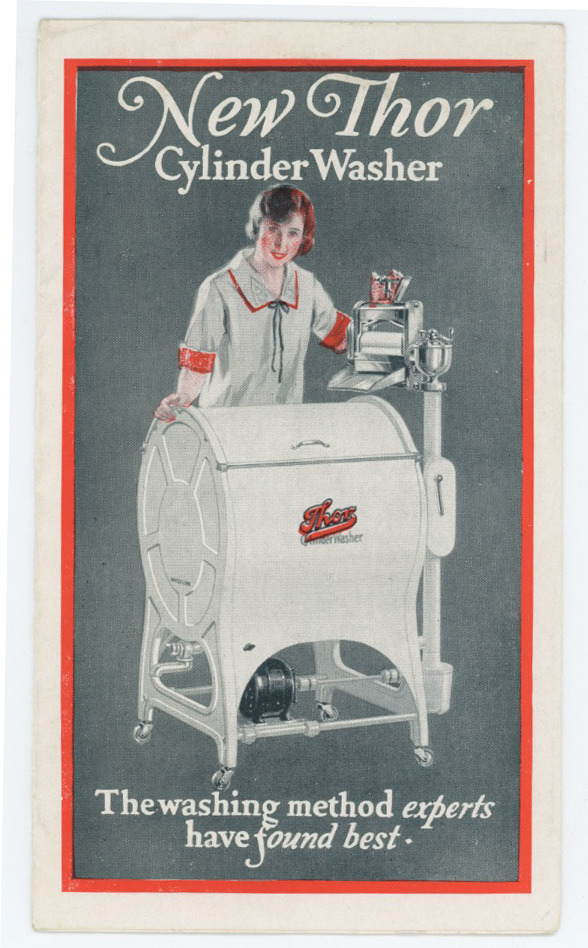
1920s ad for a Thor brand washing machine. One of the first electric washing machines. Note the exposed motor underneath that could shock users when wet. (Imagine Steve associating Thor with washing machines 😆).
Laundry machines have a long history. The first washing machines were invented in the late 1800s. There were mechanical, hand powered machines, consisting of drums full of water and handles to agitate the laundry and turn the rollers to squeeze water from washed clothes.
However, these devices were most common in middle class families. Poor families who could not afford the machines and rich families who did not have to worry about the labour of laundry likely did not have these machines.
Laundry was a laborious task and families who could afford it had hired help to do their laundry or they sent out their laundry to be cleaned and returned.
Here is an account of laundry days in the 1920s for a family who had a scullery. They used a 'washing copper' tub that was built into the floor and had a space for a fire underneath. It is interesting how it describes typical washing without a washing machine, but Steve and Sarah likely lived in a tenement apartment building and did not have these facilities available to them.
We will get into what Sarah probably did when Steve was growing up. But one last laundry innovation to talk about in the 20s was the electric washer. The first electrical washer appeared in the US before the first World War thanks to the invention of the small electric motor (Link).
This blog page gives a good overview of how a domestic electric washing machine worked in 1927. The metal drum was manually filled with water (if you didn't have a hose, lifting and pouring water into the drum was your fate). Pre-prepared soap was added then pre-soaked clothes could be washed. The machines could handle about ten pounds, so clothes had to be regularly transferred in and out. After the wash, clothes were wrung out and put in scalding rinse water to remove soap. Clothes were then wrung out again (maybe rinsed a few more times), starched, and hung to dry. Some families had heated dryer cupboards to hang their clothes.
Domestic washing machines inside the home were not common before the 50s. They were growing in popularity in the 30s, but I doubt Steve every used any type of washing machine in his own home. Depending on how well off you feel the Barneses were they may have had one, but I still feel this wasn't very likely.
In 1920 only 8% of US families owned a washing machine. And by 1941 "only 52% of U.S. families owned or had interior access to an electric washing machine—almost half of families were still hand rubbing or hand cranking laundry or using commercial services" (Link).
Tenement Laundry Days

Reproduction of 1928-1935 tenement house.
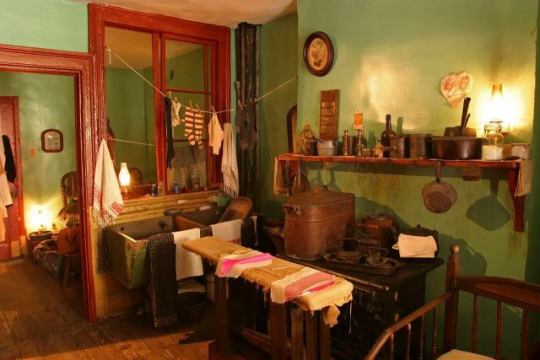
Reproduction of 1890s era tenement apartment.
Wash days were usually on Monday. Sarah probably did these steps: Soaking the laundry, scrubbing, boiling, wringing, rinsing, wringing agin, and finally, hanging to dry. (Link)
In the second picture above a scrub board can be seen in the deep sink. The sink was likely used for soaking, scrubbing and rinsing. Scrub boards were used well into the 20th century.
While indoor plumping for tenements was becoming common in the 20s (especially for toilets), if they didn't have running water Sarah would have to trek up and down flights of stairs to fill her tub from the tap in the yard. (Link) This would most likely only be the case if Steve and Sarah lived in a pre-1905 tenement building as laws about tenements changed around that time. However, many tenements were cold water flats, so water would be boiled on the stove.
In the picture above you can see a large oblong metal tub on the stove. This is likely what was used for boiling.
After soaking (usually started Sunday night) clothes that were still soiled would be scrubbed, then the laundry was boiled. Clothes were boiled in water for an hour and stirred with a rod or wooden stick. They would then be removed with a fork or a rod, wrung out, rinsed (to remove soap) and wrung out again.
If Sarah (or Winifred) was able to afford it she may have a mangle to squeeze the water from washed clothes ($5.95-8.00 for a basic one in 1920). These two wooden rollers were dangerous because women could get their fingers or hair caught in them. They also sometimes damaged or broke off buttons. If she didn't have one, she'd wring them out by hand.
The spin cycle was developed to wring out clothes, and some electric washers had this feature going into the 30s. (Link)
Once wrung out, the clothes were hung to dry. In the winter clothes could be hung in front of the fireplace or stove (on a clothes horse for those who had one) if there was space, but they could also be hung outside to freeze and brought in before nightfall.
Tenement buildings commonly had clotheslines strung between buildings. "The advantage of living on a low floor (with fewer flights of stairs to climb) became a disadvantage on wash day, because when hanging your laundry out to dry, ‘someone else might put out a red wash or a blue wash over it, and it drips down and makes you do your wash all over again." (Link)
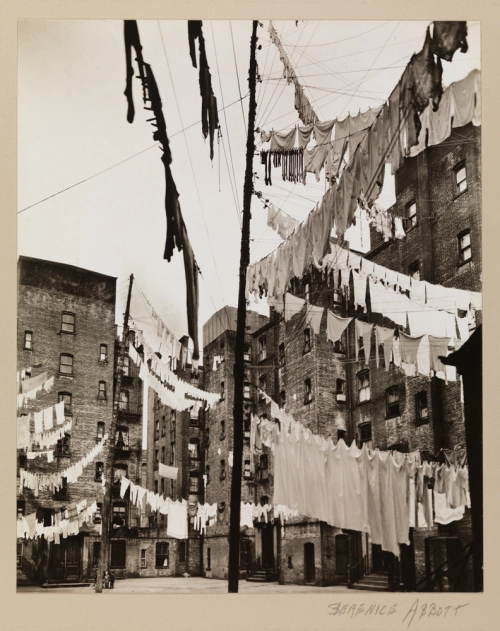
Berenice Abbott (1898-1991). Court of the First Model Tenements in New York City. March 16, 1936. Museum of the City of New York. (Link, many other examples of tenement clotheslines here. I think this is multiple days of laundry lines in one picture).
Abbott documented this space as a communal laundry line: ropes with pulleys led from apartments to five-story poles imbedded in concrete. Abbott made two exposures, with the laundry and poles forming different abstract configurations. She later recalled that winter day the laundry frozen stiff and the children huddled together, too cold to move.
If you didn't have a clothesline near your window you could dry your clothes on the roof. This required climbing more stairs and keeping an eye out for thieves. (Link)
Tuesdays were ironing days. There were electric irons in the 20s but people also still used multiple irons that had to be heated on the stove. Clothes needed to be damp and sprinkled with water while ironing. That is until steam irons were introduced in the 30s. (Link)
However:
What did Steve do after Sarah died? The same thing the Rogers would have done if Sarah had no time to do laundry, which is likely because she worked full time and laundry was an long chore. If Sarah did do her own laundry as well as worked, she would have worked very long hours trying to stay on top of everything.
For those who couldn't do laundry they would send out their laundry. The peak of the commercial laundry industry was in the 1920s. Many laundries were owned by Chinese immigrants and these laundries catered to single men. (Link) These laundries were cheaper than white-owned steam laundries, which generally catered to large institutions like hotels and hospitals, although they advertised to women as well. Here is a picture of a large commercial laundry.
Sending out laundry may have been a necessary expense on Sarah and Steve's part that they had to budget for. This recounting of a Chinese laundry has the clothes dried and ironed by the workers.
Women, especially black women, took laundry into their home. It is possible Sarah and Steve sent out their laundry to washerwomen, perhaps even one who lived in their own tenement. (Link)
If Sarah did not have the time, nor could afford to send out laundry (especially in the 30s), Steve may have had to deal with the shame of going to school in dirty clothes. Cleanliness was a point of pride and I'm certain Sarah would have made every effort to keep him clean but it may not have always been possible.
Laundry soap
Here is what was most typically used as laundry soap. It was also common, especially for rural families, to make their own soap out of lye and grate or cut up that as laundry soap. (Link)
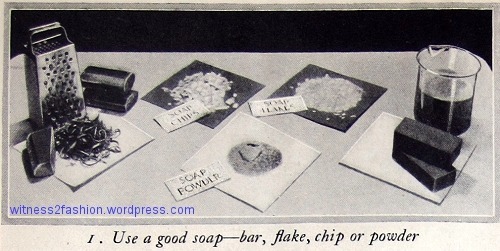
(Link) Laundry soap options in 1927. They included purchasing flakes, chips, or powder; liquifying your soap ahead of time (right); and (left) grating your own laundry soap from a bar. Fels Naptha soap, which came in a big bar, was rubbed on difficult stains and rings around the collar.
Laundromats
The first laundromat or 'washateria' was opened in Texas in 1934. (Link) Laundromats grew in popularity and spread across the country. These early laundromats had rentable electric washing machines like the ones already mentioned in this post. Clothes were taken home damp to be ironed.
In the 40s the name laundromat became common to describe self-serve laundry. This name actually comes from a brand of automatic washing machine. (Link) Laundromats helps familiarize consumers with washing machines and grow their trust in them, thus ushering in the domestic washing machine age in the 50s and 60s and the decline of commercial laundry services.
Steve may have used a washateria or laundromat in the late 30s or early 40s but the machines would be different. They may have looked something like this:
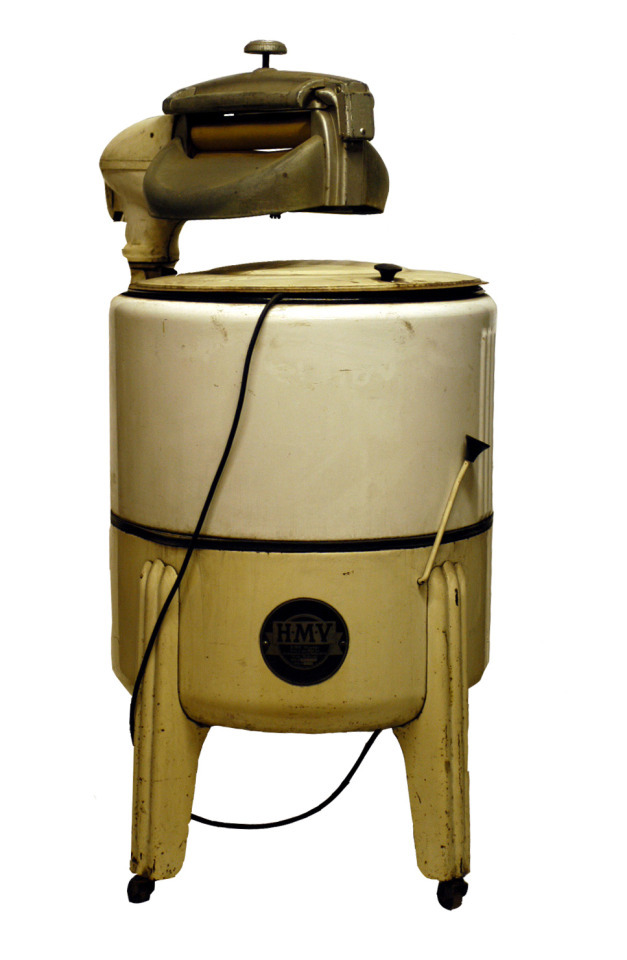
Toploading washing machine bought in 1939 (Link) It has a motorized mangle.
This blog also has many 1940s ads to show other styles of washing machines. I think our modern washings machines would be somewhat recognizable if Steve saw these ads, but in general washing machines now look very different from the ones he probably saw.
Dryers
If one didn't hang their clothes to dry they were probably wealthy enough to have air dryers which became available in the early 1920s. These were rooms or cupboards. "These dryers could be powered by electricity, gas, or kerosene. In a good dryer, heated air circulated around the clothing so that the clothes did not bake and yellow. The hot air was pulled out of the cabinet and up a chimney" (Link).
Richer folks could also have their clothes dry in sunlit or steam-heated rooms at the top of their mansion or townhouse. (Link).
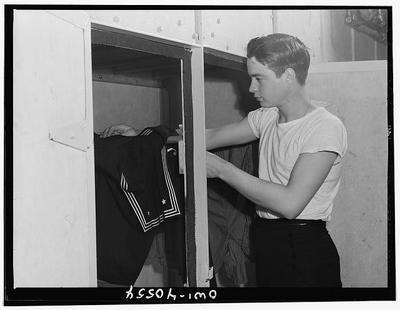
A sailor getting a uniform out of a clothes dryer in 1943 (link)
The first electric dryer was manufactured in 1938. (Link) Here's a picture of a 1940s dryer, it looks a bit like an oven.
Automatic dryers were slower to arrive. Launderettes had dryers after the war and this helped facilitate the arrival of dryers in the home.
Before dryers became common in laundromats clothes were taken back damp and ironed. This was more or less ideal anyways since clothes needed to be damp to be ironed if you didn't have a steam iron (which was still a luxury).
Dryers would be very new or completely foreign for Steve. I doubt he used one.
Army Laundry Days
This post is already long (I know), so quick coverage of what I found here.
Army training camps had laundries. The army developed laundry trucks (Quarter Master Laundry Units) to service medical units and troops in the field.
When the trucks couldn't keep up with the front (although they did their best) soldiers made arrangements with local laundries or cleaned their clothes themselves.
Clothing exchange was sometime done instead of cleaning and returning the same clothes to speed up the process. This was done most often with front line troops, often in conjunction with showers.
Steve specialised uniform (really, all of the commandos' uniforms) would probably complicate this process which is really interesting to think about. This wash trucks wouldn't be able to just bring standard uniforms to switch out since they were all wearing different uniforms from different armies. If it could be arranged beforehand they might be able to bring a new uniform for Steve, but I wonder if he wore regular fatigues most of the time and only switched into his Captain America suit during active missions to make things easier.
The mobile laundries also organized clothing repair.
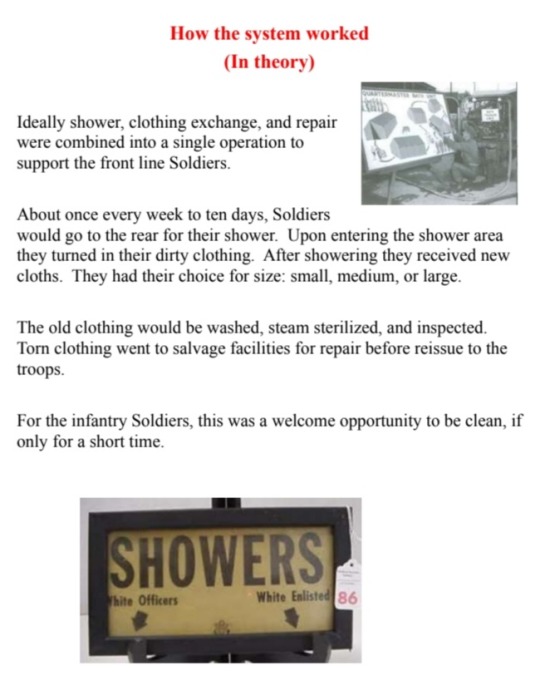

This post got really long! I didn't get into the detailed steps of laundry before modern technologies really took off. But needless to say there's still a lot that could be said.
I have a housekeeping book from 1952 that goes into detail how to wash clothes. If anyone is interested in a post about that, you can let me know. I also have a catalogue reproduction showing laundry machines and prices from the early 20th century if anyone is interested,
Sunday Steve Masterpost
#sunday steve#steve rogers#laundry#washing machines#dryers#early 20th century#american history#history#Sarah rogers#washing clothes#laundromat#steve rogers meta#meta
28 notes
·
View notes
Text
“In the roughly organized armies of 16th century Europe, there was literally a woman with every man. They were partners in pillage. “When you recruit a regiment of German soldiers today, you do not only acquire 3,000 soldiers; along with these you will certainly find 4,000 women and children.” So observed Johann Jacob von Wallhausen in his 1615 treatise on war, Kriegskunst zu Fuss.
During the 16th and 17th centuries, great crowds of camp women were not unusual; they were the rule. Not mere camp followers, women were an essential element of military forces in the field, providing many services to the troops. In fact, the presence of these women helps explain the very existence of early modern European armies and the conduct of war.
The tasks performed by camp women did include prostitution, but also traditional women’s work like laundry, meal preparation and petty commerce, and even heavy camp labor—contemporary woodcuts often illustrate a soldier paired with a woman, who is usually bent under a heavier load than that borne by her male companion. The most important contribution of women in this era, however, was the seizing and managing of pillage. Without pillage, armies could not exist.
During the 16th and 17th centuries, European rulers, including Philip II of Spain and Louis XIII of France, commonly fielded armies they could not afford to pay or supply. Troops from the Spanish army of Flanders, for instance, charged in 1594 that they had not been paid for 100 months. Even when men did receive their pay, it was often insufficient to sustain them.
A 1574 document complained that whereas a frugal soldier would need 10 pattards per day just for food, he received only four. Although soldiers were supposed to be fighting to earn money, one observer of the Thirty Years’ War (1618–48) wrote, “If you will consider how their wages are paid, I suppose, you will rather think them Voluntaries, at least very generous, for doing the greatest part of their service for nothing.”
Some commanders even saw an advantage to paying troops irregularly. “To keep the troops together, it is a good thing to owe them something,” observed the great Spanish general Ambrosio Spinola. His harsh logic held that troops would be less likely to desert if they expected to receive back pay in the future. However, while underpaying troops might keep an army together, it practically guaranteed a breakdown in discipline, as troops turned to plunder as a form of compensation.
Troops with empty pockets and empty stomachs took matters into their own hands. Some responded by mutiny; the Spanish army of Flanders, commanded by such great generals as the dukes of Alva and Parma, suffered more than 45 mutinies between 1572 and 1607, including the horrendous 1576 Sack of Antwerp.
Most troops sought sustenance and compensation on campaign by pillaging the civilian communities that lay in their paths. “It is deplorable that our soldiers dedicate themselves to pillage rather than to honourable feats,” wrote Pierre de Brantôme of his experience during the French Religious Wars (1662–74). “But it is all due to their not being paid.”
Princes might issue high-sounding declarations condemning troops for abusing civilian populations, but the bitter reality was that if those same rulers actually eliminated such excesses, they would have had to disband their armies as unaffordable.
The practice of allowing soldiers to pillage permeated the era. It was accepted as a distasteful but practical necessity. “One finds enough soldiers when one gives them the freedom to live off the land, and allowing them to pillage supports them without pay,” concluded the annual register of current affairs, the Mercure François, in 1622.
French monarch Louis XIV (r. 1643–1715) offered the same observation in his memoirs for the year 1666: “Of late, some commanders are found who have made great armies subsist for a long time without giving them any pay other than the license of pillaging everywhere.”
Pillage and its associated savagery—beatings, torture, rape and murder—certainly warranted condemnation, even when inflicted on civilians loyal to the enemy. However, raiders made little distinction between friend and foe, even victimizing the loyal subjects of the government served by the soldiers.
One observer described shameful conduct by the Florentine Black Bands as they marched through friendly territory in 1527: “[They are] worse than Turks. In the Valdarno, they have sacked three Florentine villages, raped women and perpetrated other very cruel things.” Troops fielded by the Bourbon kings of France notoriously ravaged the French countryside during the first half of the 17th century.
Because pillage was officially outlawed—if actually tolerated—the take from plunder was not tallied in royal accounts, even though it constituted a high proportion of military personnel expenses. Consequently, the true size of the pillage economy will always remain more or less unknown. This is further compounded by the fact that pillage supported not only soldiers, but also the vast array of civilians who accompanied them in the field, including camp women, who mastered the brutal business of plundering.
A military force in the field during the early modern period did not resemble an army as we know it today. Soldiers constituted only part of a campaign community, in which they lived symbiotically with male and female noncombatants. Officers and soldiers employed servant boys. Teamsters hauled wagons and cannon using draught animals supplied by private contractors.
Entrepreneurs supplied bread to armies, sending their own staffs, including bakers, into the field. A large collection of other tradesmen—blacksmiths, wheelwrights, carpenters—served the community. Merchants and sutlers sold essentials and amenities to the troops.
Comprising such a varied multitude, a campaign community rivaled in complexity and size all but the largest towns of the day. A force of 25,000 soldiers with its accompanying supporters represented a larger population than that of contemporary Bordeaux, Strasbourg, or Turin. It is no exaggeration to describe military camps as cities on the march.
The campaign communities, moreover, formed a world apart, living according to their own rules, which were often quite hostile to civilian society—and vice versa. A mercenary principle drove enlistment; most common soldiers joined the ranks because they had few other options and hoped to fare better on campaign.
A German woodcut dating from the 1530s makes this point with a poem attached to an illustration of a would-be Landsknecht, the much-feared, heavily armed Germanic mercenary of the 16th century: A tailor complains, “I must sit long hours for little pay with which I can hardly survive,” so he decides to try his luck in “the open field to the sound of pipes and drums.”
The Englishman Sydnam Poyntz confessed a similar reason for enlisting in the 1620s: “My necessitie forced mee, my Money being growne short, to take the manes of a private soldier.” Women opted for camp life with much the same rationale.
This need to survive and a desire to prosper ensured that men and the women who joined them on campaigns would prey upon the unfortunate civilian communities that lay in their paths. Troops quartered in civilian homes abused their hosts; pillagers stole, raped and murdered. The result of such violence was a pervasive animosity toward armies that, in turn, inspired the campaign community to reject the civilian world, its mundane life and its standards of propriety.
Although common soldiers came from the peasantry and urban working classes themselves, they announced their separation from such origins by sporting distinctive and often outlandish apparel. Most extreme was the bizarre multicolored and slashed garb of Landsknechts, though soldiers of other nations adopted their own extreme fashions.
An early 17th century description of Spanish infantry claimed, “It is the finery, the plumes and the bright colors which give spirit and strength to a soldier so that he can with furious resolution overcome any difficulty or accomplish any valorous exploit.” These sons of the laboring classes transformed themselves from subservient sparrows to aggressive peacocks.
Campaign communities lived by codes that were libertine and brutal. Soldiers of the early modern era were known for drinking, gambling, wenching and fighting. The novelist Johann Jacob Christoffel von Grimmelshausen, who had fought in the Thirty Years’ War, summed up the soldiers’ lifestyle with its violence, suffering and poverty:
Their whole existence consisted of eating and drinking, going hungry and thirsty, whoring and sodomizing, gaming and dicing, guzzling and gorging, murdering and being murdered, killing and being killed, torturing and being tortured, terrifying and being terrified…pillaging and being pillaged.
Within this hard and hostile community, women performed a broad range of tasks. The most obvious, but by no means the most characteristic, employment was prostitution. The term “camp follower” is often regarded as synonymous with prostitute, and there is no question that prostitutes plied their trade with the troops.
Many military authorities favored having them in camp for reasons of public order and efficiency. Public order argued that soldiers who relied on camp prostitutes for sex would be less likely to trouble respectable women; according to Mathieu de la Simonne, writing in the 1620s, “It is good for the local inhabitants, it is said, because their wives, daughters and sisters will be more in security.” Efficiency justified bringing along a limited number of prostitutes to satisfy the men’s urges instead of dragging along a far greater number of wives who would encumber armies.
Over time, however, tolerance of camp prostitution declined. Rising rates of venereal disease led commanders to see prostitutes as dangers to health, and the strict moral codes brought about by the Reformation and Counter-Reformation advocated marriage and condemned prostitution outright. Frederick William, the great elector of Brandenburg, banned prostitutes from his army by an article of war in September 1656, as did Louis XIV from French forces in the 1680s.
The great majority of camp women belonged to two other categories: wives and so-called “whores”—the unmarried female partners of soldiers. These women were not prostitutes, as each accompanied a single man, yet contemporary accounts often refer to them as “whores,” and the officer in charge of keeping order among camp women on the march was known in German as a Hurenweibel, or whoremaster.
The nature of the relationship between a soldier and his whore is suggested by the German practice of “May marriages,” agreements to stay together for the campaign season, which traditionally began in May. Dionysius Klein, writing at the end of the 16th century, described such liaisons and their rationales:
German soldiers, no sooner an expedition arrives, saddle themselves with frivolous and loose women with whom they contract “May marriages,” whom they drag here and there just as millers do their sacks. The soldiers enhance the situation by pretending that in war they cannot get along without women; they are needed to take care of clothes, equipment and valuables; and in cases of illness, injury or any other personal harm, the women are needed to nurse and take care of them.
Wives and whores applied themselves to traditional and necessary women’s work. Laundering, for one, was almost exclusively a feminine chore that soldiers regarded as unmanly. In The Life of Courage: The Notorious Thief, Whore and Vagabond, Grimmelshausen has his female antiheroine, Courage, declare, “I refused to let [my husband] stay in the castle without me for fear he would be eaten up by lice, as there were no women to keep the men clean.”
Basic needlework also fell to women, who repaired clothes, stitched shirts and sewed linens. Nursing, too, was considered a particularly feminine talent. When Robert Venables, one of Cromwell’s favored generals during the English Civil Wars, was censured for including his wife and allowing some soldiers to bring their wives on his disastrous expedition to the West Indies in 1654–55, he replied that experience in the Irish wars had demonstrated “the necessity of having that sex with an army to attend upon and help the sick and wounded, which men are unfit for.” Cooking, although not narrowly defined as a woman’s task, also fell to camp women.
Such gender-defined work was so valuable to an army’s health and well-being that a certain number of useful women remained with regiments in the field even after most wives and whores were driven from camps in the late 17th century. From then until the French Revolution, a contingent of 15 to 20 women usually marched in the train of a French regiment, while the British brought along about six wives per 100 soldiers until the late 18th century.
Camp women also scrambled to earn whatever they could through petty commerce. Some became sutlers (vivandières in French), peddling food, liquor, tobacco and sundries to officers and men. And camp women could be extremely creative in garnering money by more extraordinary schemes.
During the occupation of Freiburg by the Swedes in the 1630s, one citizen complained of “the soldiers’ abominable wives,” who trespassed in local gardens, cut produce as soon as it appeared, and had the gall to sell what they did not consume in the Freiburg market.
Men with female partners enjoyed an advantage. Sir James Turner, in his Pallas Armata (1683), argued that during the 1624–25 Spanish siege of Breda, in the Netherlands, “The married Souldiers fared better, look’d more vigorously, and were able to do more duty than the Batchellors; and all the spite was done the poor women was to be called their husbands’ mules by those who would have been glad to have had such mules themselves.”
Turner’s use of the term “mules” points to the heavy labor these formidable women performed. An anonymous handwritten German manuscript of 1612 detailed the load carried by women on the march:
Seldom is one found who does not carry at least 50 or 60 pounds. [The] soldier…loads straw and wood on her, to say nothing of the fact that many of them carry one, two or three children on their back. Normally, however, aside from the clothing they are wearing, they carry for the man one pair of breeches, one pair of stockings, one pair of shoes.
And for themselves the same number of shoes and stockings, one jacket, two Hemmeter [shifts], one pan, one pot, one or two spoons, one sheet, one overcoat, one tent and three poles. They receive no wood for cooking in their billets, and so they pick it up on the way. And to add to their fatigue, they normally lead a small dog on a rope or even carry him in bad weather.
The presence of so many women in the train of the army constituted a sizable labor pool that field commanders were quick to exploit. They even participated, according to Wallhausen, in the hard physical labor of siege work: “The whores and the boys [of the camp] also helped in binding fascines, filling ditches, digging pits and mounting cannon in difficult places.”
The most important contribution made by camp women lay beyond their traditional women’s work, petty commercial ventures and taxing manual labor. First and foremost, they took part in pillaging, without which early modern forces could not have maintained themselves on campaign.
Grimmelshausen’s antiheroine Courage boasted, “No one could match me at foraging.” Peter Hagendorf, author of the only extant diary by a common soldier in the Thirty Years’ War, reported how wives, his own included, pillaged the fallen city of Magdeburg in 1631 even after the fires that would destroy the city had broken out:
A cry then came from throughout the city as houses all fell on each other. Many soldiers and their wives who were searching to steal something died. God indeed protected [my wife]. After an hour and a half, she came out of the city accompanied by an old holy woman, who helped her carry bedding. She also brought me a large tankard with four liters wine. In addition, she found two silver belts and clothes, which I was able to cash in for 12 thaler in Halerstadt.
But women did more than steal; there is good reason to believe they guarded the booty and held the money gained by selling it. In woodcuts showing Landsknechts and their women, the men carry the weapons, ready for battle, while women are often shown with fat purses.
Free from the immediate risks of fighting in the front rank, they held the money for their fighting men. The preceding description of May marriages confirms that women carried their men’s clothing and other personal items, including their “valuables.” A poem accompanying a 16th century woodcut claims that among a whore’s duties was guarding the plunder:
Do well with me, my pretty lass
And stay with me in the Landsknechts
You’ll wash my shirts
Carry my sacks and flasks
And if some booty should be mine
You shall keep it safe and fine
So when we put paid of this crew
We’ll sell the booty when we are through.
Among artisan couples in the civilian community, women were similarly entrusted with holding goods and managing funds. Masters’ wives regularly made sales and tended the till. If the business maintained a market stall, this was the wife’s preserve, for the husband was needed back at the shop. Pillage was a form of this early modern family economy.
Pillage was also the business of the army. Because the campaign community was based on mercenary principles, versus those of state service or patriotism, its members were easily seduced by greed. In his 1516 colloquy “Of a Soldier’s Life,” the great Dutch humanist Desiderius Erasmus confronted a soldier with the charge, “It was not the Love of your Country, but the Love of Booty that made you a Soldier,” to which the soldier replied, “I confess so, and I believe very few go into the Army with any better Design.”
He also admits, “The Hope of Booty made me valiant.” In fact, only a few common soldiers and their women profited, but it was just enough to tempt others in a kind of lottery psychology. When Erasmus inquires of his soldier, “Well, have you brought home a good Deal of Plunder then?” the soldier replies with a shrug, “Empty Pockets.”
The unintended consequence of such unrealistic hopes of riches was the survival of military forces on campaign. Before European states developed the capacity to maintain their armies in the field, it was pillage that sustained them. The fact that women were key agents in securing and managing pillage explains the need for great numbers of them in the campaign community, as well as the radical reduction in their numbers after 1650.
Ultimately, pillaging and the abuses inescapably associated with it imposed limits on the reliability, efficiency and size of armies. To overcome these limits, European states developed the political power and administrative means to command revenues and tap credit sufficient to maintain their armies.
Rulers curbed pillage by holding officers responsible for their soldiers’ conduct and by imposing and enforcing stricter codes of discipline, but such efforts would have been fruitless were it not for major improvements in military administration and logistics, which in turn required advances in the state’s ability to mobilize and disperse resources.
These critical military and political changes affected different countries at different times, but in general the transformation occurred during the latter half of the 17th century. With distinct national twists, they were the work of Louis XIV in France, Frederick William the Great Elector (1640–1688) in Brandenburg-Prussia and Peter the Great (1682–1725) in Russia.
These monarchs’ accomplishments demonstrate that war was the engine that drove state formation in Europe. Thus the history of camp women and their involvement in pillage merges with far greater issues—the rise of the modern army and the emergence of the modern state.”
- John A. Lynn, “Women in War.”
310 notes
·
View notes
Note
now that you linked the tsau relship and summary posts, and this tiny chili emote has warmed my heart again. and then realized i dont remember if you elaborated on the shikanaru pairing (i still remember that implied shikanarau tsau art with the frog purse 😩😩😩), sooooo... take pity on me? Pls 🥺

Chili for their spicy connection 😏
A bit nsfw so under the cut it goes~
ShikaNaru are chill fwb. It’s complicated, but it’s also not.
They were chilling, smoking, and Naruto blurted out he was horny. The rest is history and Shikamaru doesn’t regret letting him suck his dick
Shikamaru doesn’t care to be exclusive (or to have an official title) and Naruto is in his ho era, so it works out.
Naruto swears Shikamaru is his favorite and is definitely bragging about why to anyone that will listen
Shikamaru usually gets dragged into threesomes because of Naruto. He only agrees if he thinks the person is attractive too
He can’t even explain why he thinks it’s so sexy to watch Shika’s back muscles flex while he’s going at it with someone else, but it is.
He also likes tugging his hair for kisses. The pissed look on his face is so hot ngl
Both are cuddlers post sex, so there’s never a need to run. They wash off in the shower together, grab some water, and hop right into bed
Shikamaru is still baffled that Naruto thinks Sasuke’s dad’s a business man. What business man looks and behaves like that?
Shika also enjoys Naruto’s enthusiasm in all things. Brightens up his day even if he’s being a little dumb
Naruto calls Shika for the most minor reasons just to hear his voice. He’s got a sexy voice 🤤
He also crashes at Shika’s place often because he’s got a better tv and he’s not as fussy as Sasuke about cleaning up because he’s got a cleaning and laundry service.
They’re often sitting together when them and their friends get together. Everyone knows they’re fwb
Sakura, Chiha, and Tenten think they should make it official because they’re really cute together. Also naruto needs to grow up before Shikamaru realizes he can find someone else
Sasuke thinks it’s not his business but also Naruto isn’t ready for commitment. Heck, who is?
Kiba thinks it’s two pretty boys thinks it’s a dumb mistake on both ends
22 notes
·
View notes
Text
on washing clothes from Mend! A refashioning manual and manifesto by Kate Sekules
(please buy the book, or rent it from a library, or order it through a library to rent from them, or rent it through a library ebook collection etc. etc.)
Wash Less
Washing is killing your clothes. Every laundering shortens a garment’s life by, oh, a month (see endnote 8*). I bet the source of the one-wear wash idea was Procter & Gamble’s Mad Men–era marketing team: overwashing sells more Tide (it can also redeposit soil on clothes and set stains permanently). Not washing is getting awfully trendy now, for green reasons, but the main mend-related reasons are that less washing—and definitely less tumble drying—paradoxically saves your favorite clothes, and probably time, too.
There are three reasons to wash a clothe: removal of stain, or of germ, or of smell. I daresay smell (or fear of) is what propels us fastest to the washing machine. But listen up.
Less Laundering ≠ More Stinking
To overgeneralize, but not really, because athleisure, clothes get stinky when they’re made of synthetic fiber. Ridiculously, the clothes manufactured expressly for sweating into are the most petrochemical of the lot.
Yes your performance fiber top wicks your sweat, but then it hugs it to its bosom, maybe refusing to let
it go, ever, in a phenomenon scientifically named perma-stink. Synthetics are hydrophobic but oleophilic—they hate water, but love oil—so they cling jealously to body odor compounds, but refuse the advances of your washing machine.
The more you fight your running tights, the more they resist—dryer sheets and extra detergent and heat drive the smell-causing bacteria deeper into the fibers, where they take up residence. Antimicrobial finishes such as silver chloride don’t deter them at all. It is gross.
I’m not here to lecture on eco-water-saving detergent-minimizing, though this is a happy side effect of many old-new methods.
I’m here to keep good clothes alive and mendable. I confess I’m a bit conflicted about stains. Set-in stains invite mending, and mends invite conversation, and then you can tell everyone about the bacteria partying in their pants.
So I’ll ignore stains, aside from the kind that attack and degrade fabric or can’t be mended or spoil the overall beauty of a thing.
Speaking of ignoring, follow only the bits that sound appealing: the last thing we want is the return of washday labor and guilt. I’ve been around the laundry block—never owned a washer-dryer till I was a mom; been a student, a traveler, dirt poor, addicted to wash-dry-fold service—and after all this, I’ve discovered that tending clothes is actually fun.
Anyway, decide for yourself. Here are assorted old-school and costume specialist hacks to mend your cleaning routine and keep your favorite garments alive:
Gym stink. Sweat is odorless. The smell is bacteria breaking down proteins into acids. Left in a swampy pile, these reproduce like a horror film. Arrest the breeding! Rinse gym things out in plain water and hang to dry right after committing the sweat.
Or switch to all-cotton workout wear. It’s hydrophilic and oleophobic, the opposite of synthetics, so absorbs and holds or wicks sweat, but resists oils and smells.
Aromatic pits and the crotchal region. Sorry to be graphic, but you know what I’m talking about. Try these professional theater costume department and vintage dealer nowash fixes:
Give it a drink. Spritz generously with pure (cheap) vodka; let dry. No alcohol smell!
Connect to earth. Sprinkle fuller’s earth on the bits overnight. Vacuum up, with stink.
Acidulate. For allover smell, steam garment over a hot bath of white vinegar solution.
A paste of baking soda and water is much cheaper than Febreze and often works better.
SOS: Save Our Sweaters. Handwashing in cool water is the only way. You don’t need to do it often. Invest in perfume-priced cleansers or use baby shampoo. Rinse thoroughly, squeeze gently, then . . .
Reshape (it’s called blocking) the wet sweater on a fluffy towel, Swiss roll it, and kneel on the roll to squish out water. Never wring knitwear. Dry on a fresh towel, turning it periodically.
Air dry whatever you can, especially vintage, most of which should never go in the dryer. Your hand mends last longer when air dried, too. Use ordinary hangers if you lack line or frame.
Add a few drops of lavender essential oil to water in a spray bottle to spritz on while ironing.
Yellowed cotton might have gotten that way from dry-cleaning. Add borax to the wash. And hang out in the sun—which is mostly terrible and verboten for fabrics, because of this bleaching effect.
Care labels are often as generic as the website cookie disclaimer that you never read and fulfill a similar legal function. Nearly everything can be gently handwashed.
Exceptions are: velvet, satin, taffeta, brocade, some silks, anything tailored or structured, and everything under Special Concerns in the chart on pages 144–45 (Historic fabrics, weighted silk, embellished fabrics, real lace, metallics, 3d effect fabrics, fur real/fake, net/mesh, hand painted, leather, suede*). Beware rayon: very tricky and variable.
Spot clean and steam fancy clothes—or, in fact, most clothes. Vintage dealers do.
For embellished items, borrow the museum conservator method: vacuum on low with open vent and flat nozzle through a gauze screen edged with tape.
Forget wasteful sticky-sausage lint cleaners. Use an old-school clothes brush or the kind that picks up lint one direction and deposits it on the reverse journey.
Mildew. Omnipresent fungal spores that feast on your damp natural fibers. It’s serious and contagious. Dry, vacuum, dry-clean, revacuum. It may be too late for this poor garment.
A final little trick. Scribble all over metal zippers with graphite pencil: nonstick magic.
endnote 8*
Unreliable statistic that I made up. This is an experiment in misinformation. Because nobody’s done this math, I wonder if the figure I just invented will get quoted and thereby eventually become true?
Other notes:
No, really, perma-stink was coined by human ecology professor Rachel McQueen et al., “Odor
Intensity in Apparel Fabrics and the Link with Bacterial Populations,” Textile Research Journal
77, no. 7 (2007): 449–56.
The no wash and the dry (or raw) denim movements are ecologically motivated but are also
having the effect of bringing more natural fibers and finishes to market. They sell at a high
price point for the most part, but this is beginning to trickle down—though such clothes can’t
and shouldn’t be sold too cheap; they’re investments. Also, PS, infusing with peppermint oil or
whatever does nothing long term to decrease the need for washing: all natural, untreated
fibers are resistant to microbes.
Ulterior motive: as a lifelong devotee of pure cotton sweats, I prefer its wicking, slightly baggy,
nonstinking qualities, and wish it would catch on.
I could go on and on about detergents, which are often foul in so many ways. For an up-todate and reliable breakdown of their relative merits, see the rated reviews by the 501(c)(3)
nonprofit Environmental Working Group, https://www.ewg.org/guides/categories/9-Laundry/.
You may find your go-to wash solution has earned a solid “F” grade.
Extra credit: invest in a horizontal drying rack or make one out of window screen gauze.
A steamer is a wise investment—they’re effective, gentle, and far more fun than ironing.
#hope people find this useful#I love this book#great for learning more about fabrics#also mending them
95 notes
·
View notes
Text
Umbrella Pharmaceuticals - Chapter 32
During the first week of probation, while his classmates were busy getting acquainted with the school’s facilities, the uniforms, the nets between the three houses, and memorising the initials of all the school’s staff, Alfred was forced to lead a double life.
From half past six in the morning until seven in the evening, Alfred went about his business like any other student. In the dormitory on the first day, he endured the tears of longing for home and family from his roommates, while he himself took refuge in the bathroom to stifle them. From the second, he learned that none of them were from his class, and none of them were Scottish. Bryson, an eight-year-old southern Englishman, shared his accent and boasted of his wealth. Alfred, remembering the advice of his relatives, refused to reveal his true origins. He told how his ancestor, Veronica Ashford, a UK’s peer, had founded his house in the 19th century and been one of the leading industrialists and intellectuals of the Victorian era. At first her name did not ring a bell with any of his classmates, a fact that did not bother Alfred because it was supposed to go unnoticed. The other eight-year-old, Everett, was from the city, from Manchester, and from a less than privileged background, as evidenced by his thick regional accent and fickle manners, which contrasted with Alfred’s restrained manner, Bryson's middle-class sobriety, and the military firmness of the eldest in the room, nine-year-old Moore.
Moore was their watchman. In Watford parlance, a watchman, or wak, was a second-year pupil who helped to integrate newcomers into the school. In the school hierarchy, the wak was one step below the prefects, who were chosen from among the best and oldest pupils. The wak were responsible for ensuring that the boys behaved and did their homework. The wak were also responsible for carrying out the punishments devised by the prefects for the rebs, the naughty and disobedient boys. Moore made them aware of the rules they had to obey at all times, on pain of punishment, and of their roles. Using some abstruse criteria, it was decided that Bryson would be the morning boy, waking up an hour before everyone else and going door to door to warn them that it was time to get up. Everett was given the job of cleaner: tidying the room, making the beds and taking the laundry to the laundry room. And Ashford, as he was now known, would serve as Moore's fag because he was the youngest [1]. Alfred's reaction was to clench his fists in anger. Moore told him that his duties would include carrying his books to class, making his tea, polishing his shoes and acting as his informer. In return, Moore would protect Ashford and their relationship would ensure that when Ashford moved on, he would have a fag of his own.
On the third day, Alfred enrolled to play the piano and cello, was accepted into the school's small choir because of his particularly high voice, and joined the Northumbria House football team. On the fifth day, the opening of the school year was formalised with a closed session, which was not attended by parents. On the sixth day, Alfred received his first caution when, still angry about his role as a fag, he took out his frustration on one of the boys in his house with a hard tackle. The boy sprained his ankle, earning him an ejection and a scolding from the captain. On the seventh day, out of obligation, he went to the chapel for the morning service conducted by a Protestant priest.
From seven o'clock in the evening until nine o'clock at night, from after dinner until lights out, Alfred would temporarily go to the housemaster's office for his daily lesson in Scottish[2]. Cornwall was apparently a member of Jacob's Circle and had been instructed to teach the suitor to speak and write in the Circle's lingua franca. From eight o'clock it was his turn to study in the common room of the building with the other fifty children of the house. On Sundays, at the same time, Alfred would report to Dr Ward's office for a type of study not included in the school curriculum. Their first meeting consisted of Dr Ward explaining his role as tutor.
“Your great-grandfather Arthur left a memo for the tutor who looked after the first Ashford to come to the school.” Ward cleared his throat. “The memo tells the tutor how the Stewart is to be distinguished, and as you are an extremely intelligent young man, I will be frank about its contents. The Stewart will be instructed in the history of his dynasty and its clans, in the social role of that dynasty, in Jacobean values and ideology, in the perpetuation of his bloodline, and in the leadership of the fraternity of free men and women loyal to the Stuarts of the United Kingdom. For your role will be to succeed your father as Head of the Circle, master of your bloodline and chief of the clans, just as your father succeeded his, and so on down to Veronica Ashford. Any questions, prince?”
“No.”
“Fine. Welcome to Watford, prince.”
[1] Fagging. (UK). Fagging was a traditional practice in British public schools and also at many other boarding schools, whereby younger pupils were required to act as personal servants to the eldest boys. Fagging sometimes involved physical abuse and/or sexual abuse. Although lessening in severity over the centuries, the practice continued in some institutions until the end of the 20th century.
[2] Scottish Gaelic.
3 notes
·
View notes
Text










like or reblog if you save or use ♡
#shakira#sem psd#laundry service era#dell era#shakira lockscreen#lockscreen#lockscreen shakira#00s#90s#morena#ruiva
9 notes
·
View notes
Text
I see there is a lack of x reader in the boboiboy fandom .
Cough , cough adu du , cough , cough
So , guess who is writing about an Ejo Jo out of boredom ?
Points to a leaf for reference .
So , theotherically speaking if Ejo Jo got redeemed , of course . His top three love languages would be open to explore to its potential .
1. Physical Touch
He is 100 % touch starved . Why ? Look at him ! I'm convinced he was on his loner era for years and the only touch he had was metal . He definitely hugs his computer on rare touchy feely days . How I know ? Instincts .
2. Acts of Service
Points to his computer . He would be the guy that would be on his knees if someone besides his computer brought him coffee when he's overworking himself . You cook for him ?! If you look at the kitchen you would catch a wild Ejo Jo doing a bunch of yippies . You did the laundry ?! He would cry grateful tears .
"You did this for me ??"
3. Positive affirmations
He records it . In mind and in audio recordings , he would also write it in his diary journal .
Dear diary journal ,
Today my s/o called me pretty this morning and I'm still thinking about it when I'm writing my work . Please sent help . I don't want to go to the hospital again due to a heart attack . I will get another one when I see the bill .
That's all for now .
I'm definitely not hoping for someone specific to see this .
3 notes
·
View notes
Photo

Gordon Lightfoot, the singer and songwriter, who has died aged 84, became one of Canada’s best loved musical figures, winning 16 of his homeland’s Juno awards. He scored eight Top 5 albums in Canada during the 1970s (including the 1975 compilation Gord’s Gold), four of them reaching No 1, and Sundown (1974) topping both the Canadian and the US chart.
He was held in huge esteem and amassed an impressive track record of having his songs covered by many of the leading artists of his era. The melancholy and lonesome Early Mornin’ Rain would become one of his signature compositions, covered by many artists including Elvis Presley, Bob Dylan, Neil Young and Paul Weller. Dylan, who would perform various Lightfoot songs in his own concerts, commented: “I can’t think of any Gordon Lightfoot song I don’t like. Every time I hear a song of his, it’s like I wish it would last forever.” Marty Robbins took Lightfoot’s Ribbon of Darkness to the top of the US Country chart in 1965, Harry Belafonte delivered a dramatic rendition of Oh, Linda, and Peter, Paul and Mary had a US Top 30 hit with For Lovin’ Me.
If You Could Read My Mind became his most celebrated song, a plangent meditation on the breakup of his marriage to his first wife, Brita Ingegerd Olaisson; they later divorced. His own version reached No 1 in Canada and No 5 in the US – his other chart-topping singles were Sundown, also a US No 1, and The Wreck of the Edmund Fitzgerald – but the song went on to spawn more than 100 cover versions by such luminaries as Barbra Streisand, Johnny Cash, Olivia Newton-John, Glen Campbell, Liza Minnelli and Herb Alpert. “It was a kind of unrequited love song, partly due to love’s rollercoaster,” Lightfoot reflected.
If his personal life fuelled his art, he suffered for it too. In the early 70s his relationship with the backing singer Cathy Smith caused him a great deal of anguish – “men were drawn to her, and she used to make me jealous,” he confessed – but also prompted the writing of Sundown (when Smith was out partying without him) and Rainy Day People, a US Top 30 hit. Smith was later jailed for administering the cocaine and heroin mixture that killed John Belushi at the Chateau Marmont hotel in Hollywood in 1982.
Born in Orillia, Ontario, Lightfoot was the son of Gordon Lightfoot Sr and Jessie (nee Trill), who ran a laundry service. Jessie was quick to spot her son’s musical potential, and by the time he was 10 he was singing in public. As a boy soprano, he sang in local oratorio productions and in the church choir, and performed at music festivals. Aged 12, he appeared at Massey Hall, Toronto, after winning a singing competition. In his teens he learned to play the piano, drums and folk guitar, and was also a gifted track and field athlete.
At 18 he went to Westlake College of Modern Music in Los Angeles, where he studied orchestration and music theory. He left California for Toronto to launch himself on a musical career, working as a bank clerk to help pay the rent.
He was a member of the Singin’ Swingin’ Eight, who appeared on the Country Hoedown TV show, and played folk music in coffee houses. His first commercial recordings were released in 1962. His own composition, This Is My Song, which he performed with his singing partner Terry Whelan, appeared on the live recording Two Tones at the Village Corner, and several months later he released (Remember Me) I’m The One, another original though somewhat middle-of-the-road song, billed as Gord Lightfoot. It reached No 3 on Toronto’s CHUM radio chart. A follow-up, It’s Too Late, He Wins/Negotiations, took him to 27 on the CHUM chart.
Falling under the influence of the up-and-coming Dylan and a fellow Canadian singer-songwriter, Ian Tyson, Lightfoot began developing a more poetic, folk-style sound. In 1963 he travelled to Europe, putting in a stint as host on BBC TV’s Country and Western Show.
On his return to Canada in 1964, his reputation received a major boost when his songs Early Mornin’ Rain and For Lovin’ Me were both recorded by Ian and Sylvia Tyson and Peter, Paul and Mary. He signed a deal with Albert Grossman, the influential manager of Dylan and Peter, Paul and Mary, and released his debut album, Lightfoot!, in January 1966. This was for the United Artists label, but it was when he switched to the Warner Bros label Reprise at the start of the 70s that his career took off. His first Reprise release, Sit Down Young Stranger, reached No 12 in both Canada and the US, kicking off his spectacular run of 70s success.
His sales tailed off in the 80s, though he was constantly in demand as a live performer, and he enjoyed some belated chart success with the album Harmony (2004), which reached No 13 in Canada. However, the demands of the touring lifestyle found him dependent on whisky and pills. He would undertake arduous sailing and canoeing trips to dry out, and in 1982 finally gave up alcohol and took up daily gym workouts.
He survived a number of medical emergencies. In 1972 he was diagnosed with Bell’s palsy. In 2002 he almost died from a ruptured aneurysm in his abdominal aorta, and four years later suffered a minor stroke that temporarily impaired his guitar-playing. In 2019 he suffered a hematoma in his left leg, requiring surgery.
Lightfoot was inducted into the Canadian Music Hall of Fame in 1986 and the Canadian Country Music Hall of Fame in 2001. In 1997 he received the governor general’s performing arts award, and he was made a Companion of the Order of Canada in 2003. In 2012 he was inducted into the Songwriters Hall of Fame.
His second marriage, to Elizabeth Moon, ended in divorce, and he then married Kim Hasse in 2014. She survives him, along with his six children, Fred and Ingrid from his first marriage, Gaylen and Eric from relationships between his first two marriages, and Miles and Meredith from his second.
🔔 Gordon Meredith Lightfoot Jr, singer and songwriter, born 17 November 1938; died 1 May 2023
Daily inspiration. Discover more photos at http://justforbooks.tumblr.com
17 notes
·
View notes
Photo

(via The End of the Future)
The United States has long since become a developed country undergoing underdevelopment. Life expectancy is falling. People sleeping on park benches, in subway cars, or by the side of the road are on the rise. Whole towns and small cities have died along with the industries that once gave them life. Highways, bridges, tunnels, and electrical grids — indeed, the entire material infrastructure of public life — are scandalously rotted. Public services are run down, closed, or auctioned off to private enterprises.
Child labor, once thought extinct, an industrial medievalism of the sweatshop era, now shows up in nearly every sector of the economy from industrial laundries and auto-parts plants to fast-food eateries and construction sites. Adult jobs, once thought secure, got converted into various forms of precarious or temporary employment. Two-wage-earner families now earn what one-wage-earner families used to. Pensions guaranteeing a retirement income have either been replaced by ones tied to the fickle oscillations of the stock market or not replaced at all. The social safety net, a metaphorical exaggeration even in its best days, has become a Dickensian embarrassment.
Rural America is despoiled terrain, abandoned or the site of superexploitation by logistics and distribution networks. “Deaths of despair” — through drug and alcohol addiction, suicide — have become epidemic, in cities and in the countryside. Rights once taken for granted — the right to vote, the right to join a union — are now contested or, for all practical purposes, denied.
2 notes
·
View notes
Text
Is laundry business profitable in India?
In the realm of business ventures, the laundry industry unveils a landscape ripe with profitability in the vast expanse of India. What sets this prospect aglow? Let's delve into the intricacies:
Expansive Market Dynamics:
The Indian laundry domain sprawls across an estimated 2.2 lakh crores, a substantial chunk lingering within the realms of the unorganized sector. This paints a canvas of boundless possibilities for expansion, particularly within the organized sector that unfurls tailored, professional, and convenient services.
Escalating Urbanization and Hectic Lifestyles:
As the tide of urbanization swells, and the pace of life quickens, there emerges an augmented clamor for laundry services. The populace is willing to loosen their purse strings for the sheer convenience of sparing themselves from the rigors of laundry duties.
Lucrative Horizons:
Laundry enterprises stationed in India can effortlessly amass profits ranging between 35,000 to 50,000 rupees monthly, even in the nooks of small towns and cities. Once the break-even threshold is crossed, profit margins may soar to a notable 40-100%. The initial investment outlay is subject to fluctuations contingent upon the magnitude of your enterprise. Setting up a rudimentary laundry infrastructure could necessitate an infusion of around INR 28 lakhs. Astute management might enable you to recoup this capital injection within a brisk eighteen months.
Nevertheless, the trajectory of triumph hinges upon multiple variables:
Geographical Nexus: The strategic placement of your establishment in zones of elevated demand, such as residential enclaves proximate to office hubs or bustling commercial precincts, is paramount.
Competitive Topography: Pore over the existing laundry services in your target locale, and craft a competitive paradigm encompassing judicious pricing and distinctive offerings to ascend above the fray.
Service Excellence: Foster a reputation for delivering superlative washing, drying, and ironing services to cultivate a dedicated clientèle.
Technological Integration: Embrace the digital era with open arms, incorporating facets like online ordering systems, efficient delivery mechanisms, and cutting-edge laundry management software. This not only streamlines operations but elevates the overall customer experience. To encapsulate, the laundry domain unveils an auspicious panorama in the Indian milieu, contingent upon your ability to satiate the burgeoning appetite for both convenience and top-tier laundry services.
Learn: How to start a laundry business
2 notes
·
View notes
Text

Experience Unmatched Professional Upholstery Cleaning Services in Abu Dhabi
Elevate your furniture's longevity and appeal with Abu Dhabi Laundry Services, your trusted destination for Top-tier Professional Upholstery Cleaning in Abu Dhabi. Recognizing the vital need to maintain your valuable furniture pieces, we provide unmatched solutions dedicated to restoring and safeguarding their pristine quality.
Cutting-Edge Upholstery Treatment: Step into a new era of furniture care with our advanced Upholstery Spa treatment. Our highly skilled team uses state-of-the-art techniques and specially formulated cleaning agents, ensuring a transformative experience. Witness your furniture reclaim its original charm and freshness swiftly. Experience our exceptional Upholstery Cleaning Service in Abu Dhabi, available for hassle-free 'on-the-spot' cleaning at your convenience.
Comprehensive Mattress Care: As the Leading Mattress Cleaning Service Provider in Abu Dhabi, we pride ourselves on expertly handling mattresses of various sizes and fabric types. Our unmatched mattress cleaning services set the standard across Abu Dhabi.
Preserving Allure and Resilience: Preserving your furniture's allure and resilience is our priority. Entrust us to revitalize your living spaces with our Unique Upholstery Cleaning Service in Abu Dhabi. Contact us today to give your furniture the care and attention it deserves from professional upholstery cleaners in Abu Dhabi and enhance its searchability and visibility online.
#UpholsteryCleaningAbuDhabi#FurnitureCare#AbuDhabiLaundryServices#ProfessionalCleaners#MattressCleaningAbuDhabi#UpholsterySpa#CleanLivingSpaces
5 notes
·
View notes
Text
[“Massachusetts’ women’s prison sits at the edge of the town of Framingham, roughly thirty miles west of Boston. Founded in 1877, it was one of the first separate women’s institutions in the country. For more than ninety years, it—at least partially—reflected the aspirations of nineteenth-century women reformers who fought for the creation of gender-segregated prisons to reform so-called fallen and wayward women through a program of “maternal uplift, in bucolic, cottage-style reformatories that offered a strong dose of domestic training.”
Until security was tightened in the 1960s, MCI-Framingham’s thirty-acre campus of brick buildings looked like a girls’ reform school, with its unbarred living quarters, modest fencing, and nearly all-female staff. Under Miriam Van Waters, who served as superintendent from 1932 to 1957, education and job training programs and counseling and medical services all expanded considerably, as did the institution’s indenture program through which women worked for substandard wages in nearby laundries, restaurants, and homes during the daytime. Her platform of “maternal justice” and relaxed custodial regime attracted numerous liberal admirers and boosters, yet it increasingly drew sharp criticism from conservative corrections department officials and politicians.
According to historian Estelle Freedman, several converging developments at mid-century paved the way for a more punitive Framingham in the post–Van Waters era. These forces included a rising rate of incarceration among African Americans in the Northeast that fueled white anxieties about “black criminality”; an increasingly popular narrative—stoked by the Cold War “lavender scare”—about female homosexuality running amok in women’s prisons; and the rising number of women serving sentences for “crimes against property and the person, rather than against public order.” By the 1960s, staff had received training in using tear gas inside the walls; a maximum-security program had been implemented; programming and medical care had suffered cuts; and physical isolation (often called either “administrative segregation” or “solitary confinement”) was a more common response to prisoners’ acts of noncompliance.
The origins of the proposed center for violent women at the Worcester State Hospital lay in a turbulent period at MCI-Framingham that began in the wake of the 1971 Attica prison uprising. Like their counterparts in numerous prisons and jails, Framingham prisoners organized to demand better treatment from their keepers.
The Massachusetts prison contained roughly 130 women in the early 1970s, more than a third of whom were African American. Prisoners’ concerns about the lack of health care and poor labor conditions were compounded in December 1971 when a new superintendent, Gloria Cuzzi, expanded the number of male custodial staff and enforced dress codes much more vigorously than her predecessor. These inaugural administrative acts of what activist prisoners would come to call the “Cuzzi regime” prompted nearly half of the imprisoned women to participate in a sit-in, out of which grew a prisoner grievance council. Just a few weeks later, correctional officers found groups of women partaking in unauthorized New Year’s celebrations and drinking “home-brew” in their living quarters. In response, administrators called in roughly fifty guards from the state’s men’s prisons to help turn Framingham upside down in search of contraband. By evening on New Year’s Day, thirty people had been locked in the prison’s maximum-security cells and another ten were transferred to the Worcester County House of Correction, including several of the grievance council members. Rather than quell rebellious behavior, these transfers ignited prisoner organizing.”]
emily l. thuma, from all our trials: prisons, policing, and the feminist fight to end violence, 2019
35 notes
·
View notes